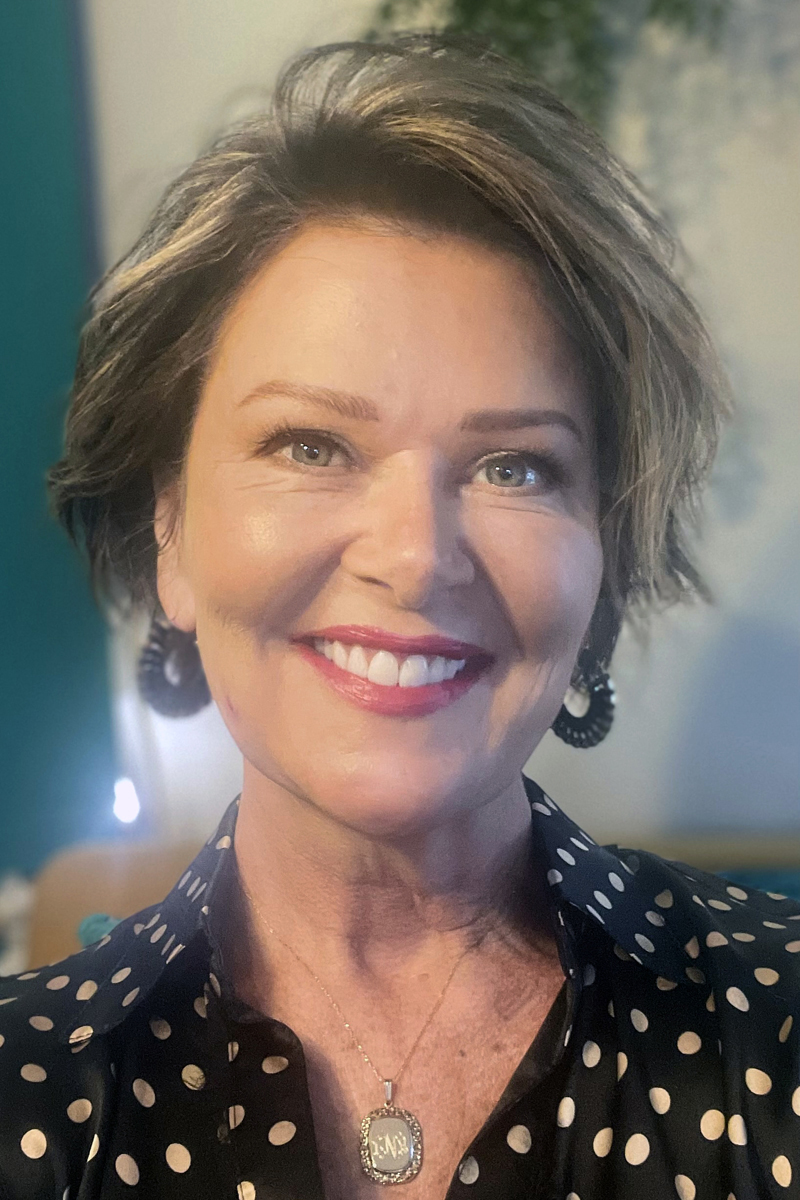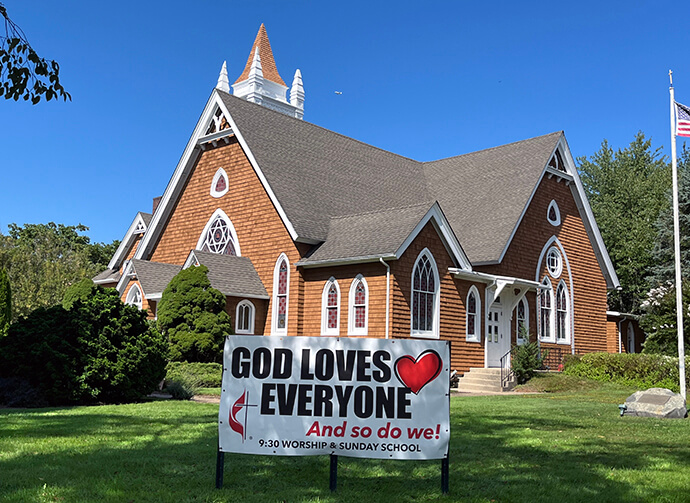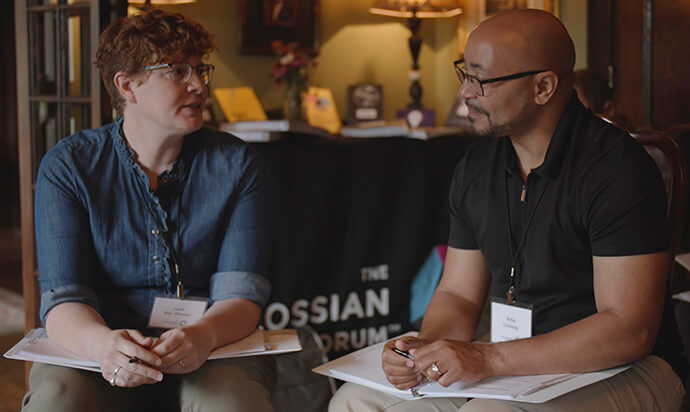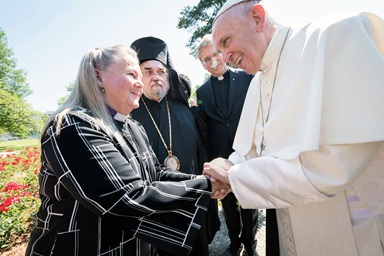Key points:
- As Christians, our task is to lean into love, yet that can be difficult in the face of personal attacks and division.
- United Methodist pastors are taking different approaches to promote understanding and radical love in their communities.
- People of faith can keep hate from taking root in their hearts and take practical steps to see the humanity in others.

Commentaries
Editor’s Note: This is the third of a three-part series.
When we see hateful rhetoric and hate crimes in the news, we may feel even more compelled to speak out in love. This counteraction ultimately increases the light of Christ’s presence in the world, overshadowing the clouds of despair.
The contrast between hate and love has varying degrees, and in any given situation, we can lean more toward one than the other. As Christians, our task is to lean into love, yet sometimes, it is difficult as tensions and divisions heighten and people suffer personal attacks.
United Methodists who are taking practical actions to “resist evil, injustice and oppression in whatever forms they present themselves” are being faithful to the calling and investing in individual and communal life. Tenacity, perseverance and faithfulness are required, as this is no easy job.
I asked United Methodist clergywomen how they are building bridges, understanding, and guarding hearts and minds in Christ. Their responses illustrate faithful efforts across the United States and prompt inspiration for others.
Intentional inclusion
When Grace United Methodist Church became aware in 2021 that there were over 500 Haitian immigrants living in Springfield, Ohio, the congregation practiced Hebrews 13:2, which reads, “Do not neglect to show hospitality to strangers, for by doing so some have entertained angels unaware.”
Their established relationships created a bond that helped them face recent hostile media rhetoric together, unifying not only people in their city but throughout the West Ohio Annual Conference and supporters throughout the connection.
In Seattle, Washington, the Rev. Ruth Marston withstood personal attacks because of Trinity United Methodist Church’s inclusion of all people. Her response? She and the congregation committed even more deeply to the practice of radical hospitality.
This public witness has helped the church become known as a safe gathering place for the community, and the local neighborhood association soon asked the church to host quarterly community meals. Together, they established relationships with those who work in violence prevention, training in nonviolence, public art creation, community building and peacemaking, expanding the church's reach into the community.
“We’re doing nothing earth-shattering or groundbreaking, just doing what we can to not accept the hate that is spreading and leaning into our identity as a place of welcome,” Marston said.

A parish-focused pastor in Staunton, Virginia, is creating a sense of belonging for those living around Christ United Methodist Church, whether or not they attend worship. When the Rev. Madison Long Ailinger introduces herself to others as their pastor, not because they are church members but simply because of their proximity to the church, this personal touch helps the congregation become more diverse.
“I really think when people see the humanity of people that (they) have deemed as ‘other,’ they start to change,” Ailinger said. She said she has seen unexpected grace as members’ hearts and minds are opened.
Building relationships
The rise of hate crimes and oppression of people has catalyzed United Methodists to study and reflect on a deeper understanding of their faith.
In Texas, a shared human need is bringing people together for grief sharing. The Rev. Kay Towns, a licensed professional counselor who authored “GRACE: A Model for Grieving: A Five-Step Guide for Healing After Loss,” is working with the Texas Annual Conference to create a new video series and grief group program that is rooted in Wesleyan theology, evidence-based and welcomes all people. The release is scheduled for summer 2025 and will be available for all faith traditions.
“Do Unto Others” is a program developed by Resurrection Church in Leawood, Kansas, that promotes relationships that focus on “Jesus, the Golden Rule and Politics” and seeks to build civility during this political season. Churches can download the resources, share the videos and dive deeper into a faith that calls us to stay rooted in Christ during uncertain times.
The Rev. Jessica Wright of the North Texas Annual Conference says, “For my middle-progressive church in a conservative part of Texas, it’s been really helpful.”
The Rev. Marianne McMasters Romanat of the Western North Carolina Annual Conference recommends “Be The Bridge,” a program focused on racial reconciliation written by Latasha Morrison. Small groups and town hall meetings unite people for understanding and increased unity in the face of racism and bigotry, using the resources.

Taking a leap of faith
The Rev. Joan VanDessel of Central United Methodist Church of Traverse City, Michigan, participated in the making of a documentary that brought pastors together for a series of retreats to get to know each other amid differing theologies.
The film “Leap of Faith” was released in theaters Oct. 4 and provides additional resources for communities to use for discussion.
Subscribe to our
e-newsletter
“I appreciate how ‘Leap of Faith’ director Nicholas Ma has talked about the project: ‘Imagine being stuck at a yearlong Thanksgiving dinner, a minefield of conversation. Now imagine at the end wanting to stay. That’s the story of this film and the hope for its viewers,’” VanDessel said.
“I’m grateful to have been invited to the ‘table’ with this project, and to have the good gift of spending a year working through what it means to be in relationship with those whose theologies differ from mine,” she said. “I think it’s some of the most challenging and most profoundly beautiful work we can do as people of faith: showing up, leaning into difficult conversations, and ultimately finding belonging amongst an unexpected ‘other.’
“Being in relationship with the 11 other pastors in this film has compelled me, probably more than any other experience in my life, to more wholeheartedly practice Jesus’ command to love God and love others.”
Providing a different narrative
Many United Methodists use signage to counter the visibility of hate and divisiveness in their communities. When anti-immigrant signs were displayed at places where day laborers gather, Hamptons United Methodist Church countered with signs of love and welcome. While city officials have been unable to stop the billboards due to First Amendment rights, hate does not have the final word in Southampton, New York.
Social media may be well known for its divisiveness, but many clergy members are using it to provide counternarratives to hateful and untrue claims and to offer daily inspiration for others.
While we may not be able to stop hate in its entirety, people of faith can keep it from taking root in our own hearts. By taking practical steps to see the humanity in one another, we shine a light far greater than ourselves, helping us stop the spread of hate and counter it with alternatives for those who are willing to heed the call.
Read the first commentary, Confronting hate: What do you wear?
Read the second commentary, What does hate feel like in the body?
Hicks is a United Methodist deacon and executive director and founder of Harper Hill Global, a non-profit specializing in mental and physical health resources.
News media contact: Julie Dwyer at (615) 742-5470 or [email protected]. To read more United Methodist news, subscribe to the free UM News Digest.




